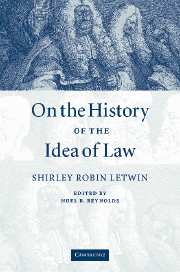2 - Aristotle
Published online by Cambridge University Press: 22 September 2009
Summary
Aristotle, like Plato, understood the character of law by analogy with a conception of the universe as a cosmos in which the elements of disorder are reduced to unity by reason. Just as reason governs the soul of a human being, so law is the source of order in communal life: “He who commands that law should rule may thus be regarded as commanding that God and reason alone should rule; he who commands that a man should rule adds the character of the beast. Appetite has that character; and high spirit, too, perverts the holders of office, even when they are the best of men. Law [as the pure voice of God and reason] may thus be defined as ‘Reason free from all passion.’” Moreover, Aristotle made the distinction between arbitrary government and the rule of law the foundation of his analysis of the varieties of political life. The manner of selecting the ruler or of apportioning offices was for him secondary to the question: Are all public decisions subject to rules of law? Monarchy, aristocracy, and politeia are all legitimate forms of government, Aristotle says, because they are all ruled by law, but a democracy, where the majority decide as they please from one moment to the next, is just as tyrannical as rule by one man without law because in both there is the same subjection to arbitrary will.
- Type
- Chapter
- Information
- On the History of the Idea of Law , pp. 21 - 41Publisher: Cambridge University PressPrint publication year: 2005



